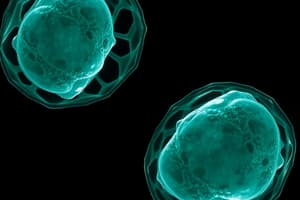Podcast
Questions and Answers
What is the process that ensures the creation of genetically distinct offspring?
What is the process that ensures the creation of genetically distinct offspring?
- Syngamy (correct)
- Mitosis
- Meiosis
- Binary fission
Which stage involves the production of mature gametes in both male and female reproductive systems?
Which stage involves the production of mature gametes in both male and female reproductive systems?
- Embryonic development
- Fertilization
- Postnatal maturation
- Gametogenesis (correct)
Which mechanism do plants utilize for reproduction that involves spermless pollination or seed dispersal?
Which mechanism do plants utilize for reproduction that involves spermless pollination or seed dispersal?
- Meiosis
- Binary fission
- Syngamy
- Alternation of generations (correct)
What is the stage where zygotes are transformed into fully formed individuals?
What is the stage where zygotes are transformed into fully formed individuals?
Which process involves a specialized division mechanism producing unique gametes?
Which process involves a specialized division mechanism producing unique gametes?
What is the stage that prepares young organisms to survive autonomously in their environment?
What is the stage that prepares young organisms to survive autonomously in their environment?
What are some of the advanced technologies enabling researchers to investigate reproductive processes?
What are some of the advanced technologies enabling researchers to investigate reproductive processes?
Which of the following is NOT mentioned as a model organism for studying biology?
Which of the following is NOT mentioned as a model organism for studying biology?
What has modern genetics research revealed about biological reproduction?
What has modern genetics research revealed about biological reproduction?
What role do collaborative teams play in scientific progress according to the text?
What role do collaborative teams play in scientific progress according to the text?
What kind of opportunities exist for aspiring biology research assistants?
What kind of opportunities exist for aspiring biology research assistants?
How do pivotal contributions made by dedicated workers impact biological understanding?
How do pivotal contributions made by dedicated workers impact biological understanding?
Study Notes
Unlocking Life's Secrets: Exploring Biology's Approach to Reproduction
In the realm of life sciences, understanding reproduction lies at the heart of biological discovery. From single-celled microorganisms to complex multicellular creatures, every living thing relies on the process of passing genetic information to new generations. Biology research assistants play a vital role in unlocking the mysteries surrounding reproduction, contributing to our collective body of knowledge while facilitating future discoveries.
Key Components of Biological Reproduction
Reproduction begins with meiosis, a specialized division mechanism producing unique gametes (sex cells) via reduction divisions. Gamete fusion during fertilization initiates syngamy. These processes ensure the creation of genetically distinct offspring. Plants employ alternative reproductive strategies, utilizing spermless pollination or seed dispersal mechanisms.
Aside from meiosis and syngamy, the journey to creating new life encompasses several additional stages:
- Gametogenesis: The production of mature gametes within the male and female reproductive systems.
- Embryonic development: Transforming zygotes into fully formed individuals, often occurring inside eggs or within specialized structures called blastocysts.
- Postnatal maturation: Preparing young organisms to survive autonomously in their environment by synthesizing proteins and membranes unique to adult life forms.
Harnessing the Power of Science to Investigate Reproductive Processes
Advanced technologies enable researchers to delve deeply into the intricate details of biological reproduction. Microscopy, molecular sequencing, and genomics tools reveal fine-scale structures, gene functions, and protein interactions essential to healthy development. By studying model organisms—such as yeast, flies, worms, fish, mice, plants, and humans—we gain fundamental insights into critical aspects of biology.
For instance, modern genetics research has revealed the molecular basis of sexual compatibility, chromosomal abnormalities linked to infertility, and the evolutionary forces shaping species adaptability. Such findings lay the foundation for developing innovative treatments aimed at preserving human health, combatting disease, and promoting sustainable population growth.
Collaborative Efforts Strengthen Scientific Progress
Collaborative teams composed of researchers, educators, technicians, and biology research assistants foster innovation by fostering a shared passion for exploration and discovery. Together, these scholars support each other's endeavors, building upon past achievements to shape the future of biological understanding.
Many opportunities exist for aspiring biology research assistants, offering the chance to engage in hands-on research, develop analytical skills, and implement experimental designs under the tutelage of esteemed experts. Pivotal contributions made by this cadre of dedicated workers drive the ongoing expansion of our collective wisdom, strengthening humanity's grasp on the secrets hidden within biological reproduction.
Studying That Suits You
Use AI to generate personalized quizzes and flashcards to suit your learning preferences.
Description
Delve into the fascinating realm of biological reproduction with this quiz focusing on the key components, stages, and technologies involved in the process. Test your knowledge on meiosis, syngamy, gametogenesis, embryonic development, and postnatal maturation. Explore how collaborative efforts drive scientific progress in unraveling the mysteries of life science.




